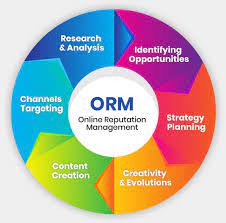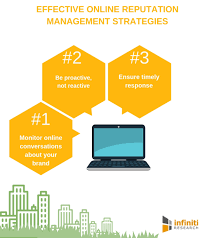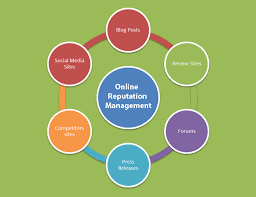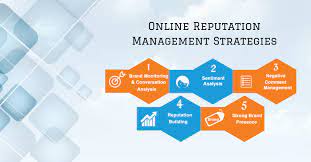An online reputation management (ORM) firm is a company that helps individuals and businesses monitor, manage, and improve their online reputation. The services offered by ORM firms vary, but typically include monitoring of online mentions and reviews, management of social media accounts and profiles, and the creation of positive content to promote a client’s online reputation.
Table of Contents
ToggleWhat is an Online Reputation Management Firm?
ORM firms may use a variety of techniques to help clients improve their online reputation, such as search engine optimization (SEO), content marketing, and social media engagement. They may also provide crisis management services to help clients respond to negative online reviews or press.
Benefits of Using an Online Reputation Management Firm
There are several benefits to using an online reputation management (ORM) firm, including:
-
Monitoring: ORM firms can monitor your online presence to identify any negative reviews, comments, or other content that may damage your reputation. They can also monitor your competitors and industry trends to help you stay ahead of the curve.
-
Crisis Management: In the event of a crisis or negative online review, an ORM firm can help you respond quickly and appropriately to minimize the damage to your reputation.
-
Improved Online Visibility: ORM firms can help improve your online visibility by optimizing your website and social media profiles for search engines, increasing your visibility and driving more traffic to your website.
Understanding Your Online Reputation
Understanding your online reputation involves knowing what people are saying about you or your business online, and how those comments and reviews are affecting your overall reputation. There are several steps you can take to understand your online reputation:
-
Google Yourself or Your Business: Conduct a search for your name or your business name on Google to see what comes up. Look for any negative reviews or comments, and take note of where they are coming from.
-
Monitor Social Media: Keep an eye on your social media profiles and mentions to see what people are saying about you or your business. Respond to any negative comments in a professional and respectful manner.
-
Check Review Sites: Check review sites like Yelp, TripAdvisor, and Google My Business to see what people are saying about your business. Respond to any negative reviews and take steps to address any legitimate complaints.
Negative Reviews and Feedback
Negative reviews and feedback can be challenging to deal with, but it’s essential to address them in a professional and respectful manner. Here are some tips for handling negative reviews and feedback:
-
Respond Promptly: Respond to negative reviews or feedback promptly, preferably within 24 hours. This shows that you are taking the issue seriously and are committed to resolving it.
-
Listen to the Customer: Listen to the customer’s concerns and acknowledge their frustration. Apologize for any inconvenience they may have experienced, and offer to address their concerns.
-
Be Professional and Respectful: Respond to negative reviews and feedback in a professional and respectful manner, even if the customer is not. Avoid getting defensive or argumentative, and focus on finding a solution to the issue.
Spencer, Stephan (September 12, 2007).”DIY reputation management”.CNETCBS Interactive. Retrieved August 3, 2012.
External Link: http://news.cnet.com/8301-13530_3-9773755-28.html
Positive Reviews and Content
Positive reviews and content are essential for building a strong online reputation. Here are some tips for leveraging positive reviews and content:
-
Share Positive Reviews: Share positive reviews on your website, social media profiles, and other marketing channels. This can help build trust with potential customers and demonstrate your commitment to customer satisfaction.
-
Respond to Positive Reviews: Respond to positive reviews with a thank you message or personalized response. This shows that you appreciate their feedback and care about their experience.
-
Encourage Reviews: Encourage customers to leave reviews by including links to review sites in your email signature, on your website, and in your social media profiles.
NetReputation is a cutting-edge online reputation management company for small businesses.
External Link: https://www.netreputation.com/
Social Media Platforms and Profiles
Social media platforms and profiles are essential for building an online presence and connecting with customers. Here are some tips for using social media effectively:
-
Choose the Right Platforms: Choose social media platforms that align with your business goals and target audience. For example, LinkedIn is ideal for B2B businesses, while Instagram may be more suitable for B2C businesses.
-
Optimize Your Profiles: Optimize your social media profiles by including a professional profile picture, cover photo, and bio. Use keywords relevant to your industry to improve your search engine rankings.
-
Post Regularly: Post regular updates, such as blog posts, news articles, and industry insights. This can help keep your audience engaged and informed.
Search Engines and SEO
Search engines and search engine optimization (SEO) are critical for improving your online visibility and driving traffic to your website. Here are some tips for optimizing your website for search engines:
-
Conduct Keyword Research: Conduct keyword research to identify the keywords and phrases your target audience is searching for. Use these keywords throughout your website, including in your titles, headings, and content.
-
Optimize Your Content: Create high-quality content that is engaging, informative, and relevant to your audience. Use headings, subheadings, and bullet points to make your content more scannable for search engines and readers alike.
-
Use Title Tags and Meta Descriptions: Use title tags and meta descriptions to provide a brief summary of each page on your website. Include your target keywords in these tags to improve your search engine rankings.
Google Alerts
Google Alerts is a free service offered by Google that allows you to monitor the web for mentions of specific keywords, phrases, or topics. Here are some tips for using Google Alerts:
-
Set Up Alerts: Set up alerts for your brand name, products or services, industry keywords, or any other topics you want to monitor. You can choose to receive alerts daily, weekly, or as they happen.
-
Monitor Your Reputation: Monitor your online reputation by setting up alerts for your brand name and any variations of your name. This can help you stay on top of any negative reviews or comments and respond to them promptly.
-
Stay Up to Date: Stay up to date on industry news and trends by setting up alerts for relevant keywords and phrases. This can help you stay ahead of the curve and adapt your business strategy as needed.
Unlike Starbucks, Pepsi delivered a public apology that only hurt their reputation further. It started when the soft-drink brand received tons of negative feedback about their 2017 ad.
External Link: https://www.pepsico.com/
Developing a Strategy with an Online Reputation Management Firm
Developing a strategy with an online reputation management (ORM) firm typically involves the following steps:
-
Assessment: The ORM firm will assess your current online reputation by conducting a comprehensive audit of your online presence, including your website, social media profiles, online reviews, and search engine results.
-
Goal Setting: Based on the assessment, the ORM firm will work with you to set specific goals for your online reputation, such as improving your search engine rankings, increasing positive reviews, or addressing negative feedback.
-
Strategy Development: The ORM firm will develop a customized strategy to achieve your goals, which may include search engine optimization, content creation, social media management, online review management, and crisis management.
InboundJunction’s client list includes startups post-funding round (often Seed, Round A and B), high network individuals as well as established businesses.
External Link: https://inboundjunction.com/clients
Assessing the Current Situation
Assessing the current situation is a critical first step in managing your online reputation. Here are some steps you can take to assess your current online reputation:
-
Search for Your Brand Name: Conduct a search for your brand name on Google and other search engines. Look for any negative reviews, comments, or news articles that may be harming your online reputation.
-
Check Social Media: Check your social media profiles for negative comments or reviews. Look for any mentions of your brand name or products and services that may be damaging your reputation.
-
Review Online Reviews: Review online reviews on sites like Yelp, Google Reviews, and TripAdvisor. Look for any negative reviews that may be impacting your reputation.
Establishing Goals and Objectives
Once you have assessed your current online reputation, the next step is to establish clear goals and objectives for your online reputation management strategy. Here are some steps to follow:
-
Identify Your Key Objectives: Identify what you want to achieve with your online reputation management strategy. This could include improving your search engine rankings, increasing positive reviews, or addressing negative feedback.
-
Make Your Goals Specific and Measurable: Make sure your goals are specific and measurable. For example, instead of saying you want to “improve your online reputation,” set a specific goal such as “increase positive online reviews by 20% in the next three months.”
-
Consider Your Audience: Consider your target audience and what matters to them. For example, if you are a restaurant, your audience may care about the quality of your food and service, so you may want to focus on increasing positive reviews and managing negative feedback related to those areas.
Jump up to:aKrolik, Aaron; Hill, Kashmir (2021-04-24).b”The Slander Industry”.The New York Times.ISSN0362-4331. Retrieved 2021-04-26.
External Link: https://www.worldcat.org/issn/0362-4331
Crafting a Plan to Reach These Goals
Crafting a plan to reach your online reputation management goals is an essential step in the process. Here are some steps you can take:
-
Determine Your Tactics: Based on your goals and objectives, determine the tactics you will use to achieve them. This may include creating and publishing content, optimizing your website and social media profiles, responding to reviews and comments, and monitoring your online reputation.
-
Allocate Resources: Determine the resources you will need to execute your tactics. This may include hiring an ORM firm, hiring additional staff, investing in advertising or content creation, and purchasing tools and software.
-
Set a Budget: Set a budget for your online reputation management efforts. Determine how much you can realistically spend and allocate your resources accordingly.





